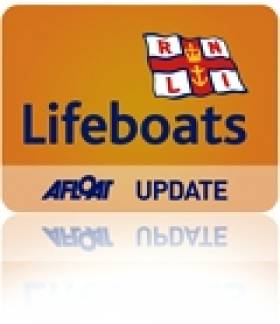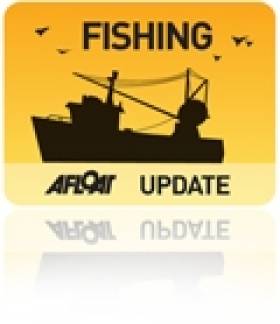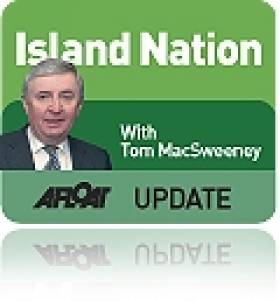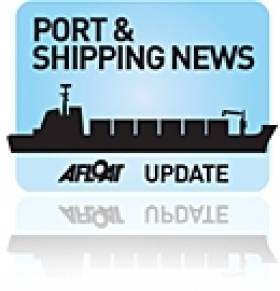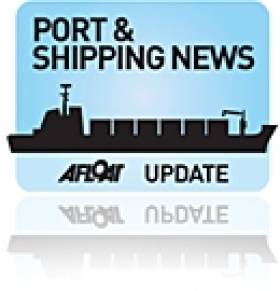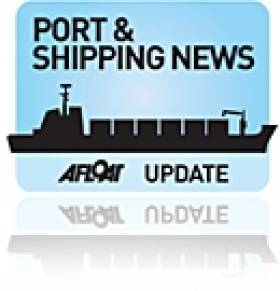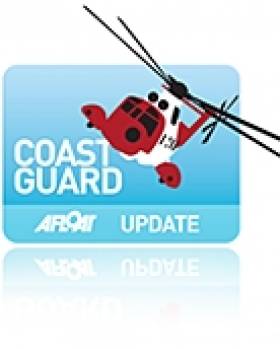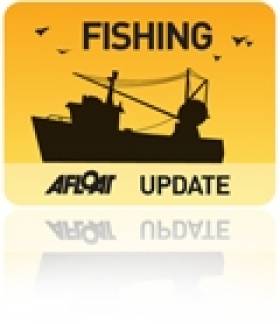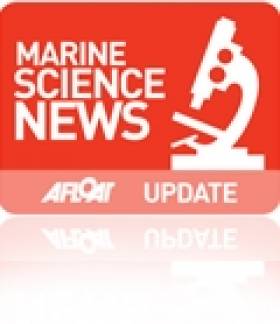Displaying items by tag: Simon Coveney
Terry Johnson Recognised for his Work with RNLI Ireland
Approximately forty Life Governors of Irish Water Safety were in attendance at the ceremony. They included former Minister Bobby Molloy, former Director of the Coast Guard Captain Liam Kirwan, former Chairman of the National Safety Council Cartan Finnegan to name but a few. Also in attendance was Commodore Mark Mellett DSM, Flag Officer Commanding the Naval Service, Mr. Chris Reynolds current director of the Coast Guard.
Guest Speakers were Mark Mellett, Director of the Naval Service, TJ Mc Carron, Ballybunion Community Rescue Boat, Eddie Breen and County Manager of Wexford Co Co.
Minister Coveney sought the meeting with the Commissioner to discuss the planned reform of the Common Fisheries Policy (CFP) and other topical issues on the fisheries horizon at present. Minister Coveney invited Commissioner Damanaki to Ireland to meet the Irish Fishing industry in coastal communities.
Minister Coveney said "It is important from the perspective of furthering Irish ambitions that I build up a close working relationship with the Commissioner, so I saw this as an important opportunity to develop a rapport and connect in a meaningful way with Commissioner Damanaki. I had a frank and forthright discussion with her on the Reform of the CFP, and on Ireland's priorities."
The Minister set out key priority issues for Ireland in the CFP reform. A major priority is the retention of the Hague Preferences, agreed by Heads of State in 1976 by way of the Hague Resolution, under which Ireland receives additional shares of quotas for the whitefish stocks around our coast. There was been strong pressure from certain Member States that these should be abolished in the Reform. Minister Coveney said "Any interference that results in Ireland losing the current benefits of the Hague Preferences within the reformed CFP would be totally unacceptable to me. The Hague Preferences were the payment made for Ireland granting access to our waters to other Member States and a recognition of the high costs involved for the State in the control of these rich fishing grounds."
Minister Coveney set out Ireland's opposition to the mandatory privatisation of fish quotas and outlined the impacts of this policy on Ireland's coastal communities dependant on fisheries. Minister Coveney said "I used this the opportunity to explain why Ireland is strongly opposing a mandatory scheme for privatisation and trading of fish quota. I explained that the family owned fishing fleet in Ireland would be quickly bought out by international fishing companies without links to the coastal communities. I explained my strong belief that these companies would not land into Ireland and we would lose not just the jobs in the fleet but also the processing and ancillary jobs in our fishing ports."
Commissioner Damanaki has placed discarding of fish high on her agenda for the CFP reform to which the Minister made clear that he was committed to giving Ireland's support to assisting the Commissioner in identifying and implementing the appropriate measures to effectively address discards.
In addition to the issues surrounding the CFP reform, the Minister made very clear Ireland's demand for strong actions against Iceland and the Faroe Islands for their irresponsible and untenable fishing activities on the mackerel stock. The Minister said "the actions of these two fishing nations pose a serious threat to the well being of the mackerel stock which is very important to Ireland. I pressed the Commissioner to initiate strong action now, including the introduction of trade sanctions to bring pressure to bear on these two parties to come to the table with reasonable demands and agree a long term management framework for mackerel".
Finally the Minister said "I will continue to liaise closely with the Federation of Irish Fishermen and other industry representatives to further develop Ireland's negotiating position. I consider that today's meeting with Commissioner Damanaki was very useful in giving her a full understanding of Ireland's situation and the importance of the maintenance of a strong fishing industry supporting the fishing communities around our coast".
Is 'Marine' Being Got At Again?
My view was that it was a substantial change and that the pre-Election pledge of Fine Gael to co-ordinate all maritime aspects under one Department was being delivered upon and I welcomed the appointment.
But this week it has been pointed out that, while the names of other Government Departments have already been changed to their new designations under the Ministerial appointments announced in the Dail, this has not been done where the marine is concerned. The Department of the Taoiseach's website lists Simon Coveney's Department as "Agriculture, Fisheries & Food" and the Department is so far retaining that title. Its press releases have describe Coveney as "Minister for Agriculture, Food and Marine," not what the Taoiseach announced in the Dail.
This is not pedantic, but a reasonable issue to raise bearing in mind past marine experience. When Bertie Ahern abolished the Department of the Marine and assigned duties to the "Minister for Transport and Marine" in the last Government, top civil servants in that Department removed "marine" from its title. When I questioned that, I was told that a meeting of those officials had been held and that decision had been made.
So, I asked the Department of the Taoiseach this week, what exactly is the title of Simon Coveney's department. To the time of writing this column, no response has been received.
When he was Fine Gael Leader, Enda Kenny told me in a radio interview of his pride in the maritime connections of his family which had been involved in the lighthouse service.
I asked the Department of "Agriculture, Fisheries and Food" press office why "marine" was listed as third in the Minister's role rather than second, as described in the Dail. I was told that arrangements and decisions and an "SI" - "statutory instrument" - were awaited.
I will be interested to see how long that takes..
This article is reprinted by permission of the EVENING ECHO newspaper, Cork, where Tom MacSweeney writes maritime columns twice weekly. Evening Echo website: www.eecho.ie
Tributes Paid to Cork Boat Builder George Bushe
Sailing tributes have been paid to legendary boat builder George Bushe, who died last week aged 89.
Born in Baltimore, Co Cork, Bushe got his start in boat building through his father, who make traditional punts. From there he went on to Skinner's Boatyard in Skibbereen and worked with the late Jack O'Driscoll in Ringaskiddy.
In the 1960s and '70s he worked at the Southcoast Boatyard in Rochestown, where be built many famous racing boats for Cork's premier sailing clans - such as the Golden Apple for the late Hugh Coveney, father of Minister for the Marine Simon Coveney.
Bushe went into semi-retirement in the 1970s, working at the Royal Cork Yacht Club, restoring boats in winter and even racing his own until the mid 2000s.
His remains were carried to St Patrick's Cemetary in Crosshaven aboard the Cánóg, the last boat he completed and which he raced competitively as recently as 2006.
George Bushe is survived by his wife Carmel and their children: Bernice, Fergus, sail maker Majella, shipwright Mark, and boat builder and sailor Killian Bushe, who just last month received the Fastnet Award for his own contributions to sailing.
The Irish Examiner has more on the story HERE.
Inspection of Refloated Ship in Galway Bay Under Way
Marine surveyors are currently inspecting the German cargo ship which was refloated yesterday in Galway Bay after running aground early on Thursday.
The Irish Coast Guard confirmed to The Irish Times that no pollution had occurred in the grounding of the Pantanal on the south Connemara coast.
The 120m vessel was refloated at high tide yesterday morning with help from the Celtic Isle tug from Foynes in Co Limerick.
Ship managers Harren & Partner said the hull would undergo a diver inspection before the vessel sails for dry dock.
Yesterday Minister for the Marine Simon Coveney welcomed the "successful operation in very challenging conditions" and confirmed a thorough investigation of the incident by the Marine Casualty Investigation Board.
The ship had been sailing from the Mediterranean to Rossaveal to collect two monohull ferries, sold to Mauritius, that had been built to serve the Aran Islands route.
The Irish Times has more on the story HERE.
Coveney Welcomes Refloating of Ship at Rossaveal
Minister Coveney paid tribute to all those involved in what he described as "a very successful operation in very challenging conditions. Having visited Ros an Mhíl yesterday evening and spoken to those involved, including the Harbour Master and the Coast Guard, the scale of the challenge was evident, involving such a large vessel carrying a substantial fuel load. There was a very real threat to the marine environment and it is a testament to the professionalism of all those involved that such a threat was averted."
The Minister said that he was "glad to have had the opportunity to see at first hand the professionalism and competence of all the agencies involved, including the Harbour Master and his staff, the Irish Coast Guard, An Garda Siochana and Galway County Council." Minister Coveney also acknowledged the assistance and co-operation provided by the ship's representatives in reaching a successful conclusion to this incident.
Minister Coveney confirmed that "the incident would be thoroughly investigated by the Marine Casualty Investigation Board". The Minister said that "the vessel is now anchored off the north Clare coast where it is currently undergoing a detailed inspection. The vessel will continue to be monitored by the Irish Coast Guard on the AIS system (Automatic Identification System)."
Minister Coveney is meeting the Harbour Master and will be briefed by the various agencies who are involved in the operation, including the Irish Coast Guard, Galway County Council and the ship's representatives and will be given a full assessment of the current situation and the contingency arrangements being put in place by the agencies involved for the next few days.
The Minister said "I am anxious to see the situation for myself and to express my support to all involved in this multi-agency operation. While this is obviously a very serious and evolving situation, I have full confidence in the Harbour Master and his staff, the Coast Guard and the other agencies involved to do a fully professional job to address the current situation. The purpose of my visit is to reassure all those concerned that this incident is getting the priority it deserves. I am especially concerned to ensure that all appropriate measures are taken to protect the harbour and the local environment and to avoid any pollution during the very challenging efforts to refloat the vessel. "
The current situation and the weather forecast are being carefully monitored by the Coast Guard. Initial investigations, including evidence from divers, indicate no apparent damage to the vessel and no pollution has been reported. Meanwhile, the vessel's owners are in the process of organising tugs to help move it from its current position.
Marine Minister to Have Air-Sea Rescue Remit
Minister for the Marine Simon Coveney will have the remit for air and sea search and rescue services, it has emerged.
The Irish Times reports that the move is part of a promised consolidation of maritime functions under the new programme for Government.
Responsibilty for the Irish Coast Guard will however remain with Minister for Transport Leo Varadkar until an official transfer which is expected in the next few weeks.
Meanwhile, fellow Fine Gael TD and Minister of State for NewEra, Fergus O'Dowd, intends to push for a review of the State's €500m contract for search and rescue services with CHC Ireland.
O’Dowd said there were “significant questions to answer” over the deal signed by former Transport Minister Noel Dempsey last year.
The Irish Times has more on the story HERE.
Coveney to Focus on Future of Coastal Communities
The meeting focused on the key areas of importance to both countries in the Common Fisheries Policy. Minister Coveney said "I consider that the Reform of the CFP to be absolutely crucial to the future of the Irish fishing industry and I am committed to working to deliver a reform package that works for Irish fishermen and also ensures that fish stocks are rebuilt and are managed in a sustainable way. Coastal communities are directly dependent on a healthy fishing industry and the new CFP must deliver long term economic activity and employment for these communities. My experience to date in public life has reinforced the importance of building trust and a positive relationship with key decision makers. My relationship with the Spanish Minister with responsibility for fisheries is important in that regard. Today was an important first step in that relationship".
Minister Coveney and Minister Rosa Aguilar agreed to focus on key elements of the CFP Reform and to develop a mutual understanding in advance of key negotiations later this year. A joint statement on the areas of mutual interest that were discussed is attached. Minister Coveney said "While there are certain areas where Ireland and Spain have opposing positions, particularly in relation to access to fish stocks, there are many areas where both countries have similar concerns. Both countries have coastal communities very dependent on fishing and related activities and the new CFP must be reformed to work positively in the long term to support these communities".
Minister Coveney added "The development of mutual understanding on core issues including effectively addressing discards, will be critical in the negotiations. I am also convinced that the consumer must be given clear information on the origin and production methods of fish in order to be able to make an informed choice. This approach will, I firmly believe, benefit EU fishermen and aquaculture operators who operate under strict environmental and food safety rules. I am seeking to reform the CFP in the area of governance so that stakeholders are given a key input into management arrangements that are developed on a regional basis. Both Minister Rosa Aguilar and myself are convinced of the importance of increased EU funding to support the reformed CFP.
I will be consulting closely with the Irish fishing industry and other stakeholders over the coming weeks so that I have a full understanding of all the issues. We have the opportunity now to deliver real reforms and I consider that we must work closely with other Member States on areas of mutual interest and importance to develop a policy that ensures that there is a future for Irish fishermen and coastal communities".
Seeing the capabilities of Ireland's largest research vessel and the work of the Marine Institute, Mr Simon Coveney highlighted the importance the Marine Sector has on the Irish economy. "The seas and ocean that surround the land of Ireland is arguably one of our countries greatest natural resources. Through marine research, development and sustainable management, Ireland is developing a strong reputation as an emerging centre of excellence, where we have prominent roles in many European and international marine science bodies," he said.
Ireland's national research vessels RV Celtic Explorer and RV Celtic Voyager will record 627 days at sea between the two during 2011. Their work will range from fisheries surveys to underwater mapping and from climate studies to deepwater surveys with the remotely operated submersible ROV Holland 1.
"The work conducted on the vessels continues to feed into the success in attracting EU funding to Ireland's marine science programmes that have been achieved by our strategic approach to marine science planning" explained Dr Peter Heffernan, CEO of the Marine Institute.
"The award of funding projects shows that partnerships between academics and small businesses can yield significant dividends in creating jobs, generating economic revenue and the supply of raw materials for new industries ranging from ocean energy and environmental monitoring technologies to marine-inspired pharmaceuticals and food ingredients" he further said.


























